Mike Pompeo and the Soft Bigotry of Low Expectations
The new Secretary of State is an improvement over the worst Secretary of State in history.
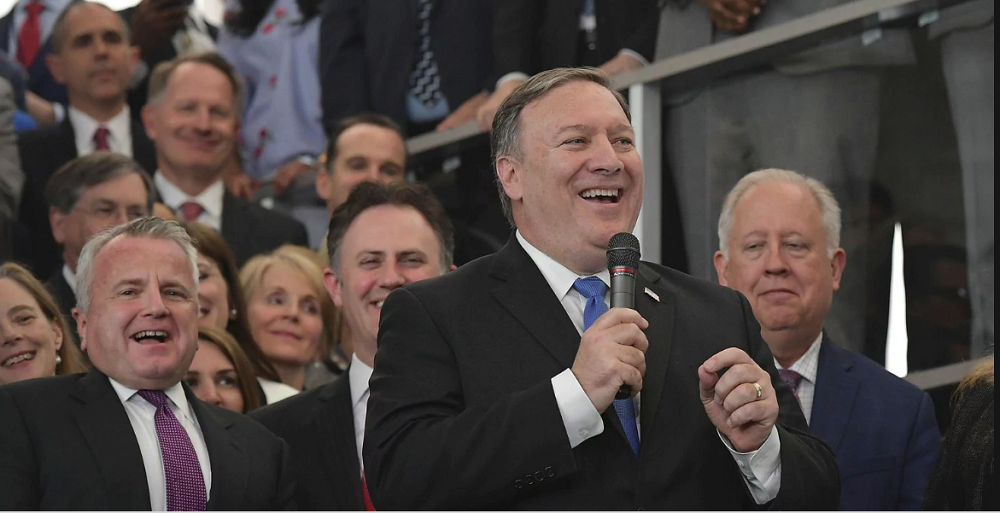
The new Secretary of State is getting rave reviews for . . . not being Rex Tillerson.
Foreign Policy (“Pompeo’s First Mission: Restoring State Department’s ‘Swagger’“):
In his first week on the job, U.S. Secretary of State Mike Pompeo jetted off to Brussels to meet his NATO counterparts and bounced around the Middle East. Now, on his first day back in Washington, he is re-shining the spotlight on the role of America’s top diplomat.
But he says one of his top priorities now is to restore “swagger” to the State Department after a rough 14 months under his predecessor, Rex Tillerson. Pompeo immediately tried to set himself apart in brief welcoming remarks to State Department employees on Tuesday that were heavy on flash but light on substance.
Pompeo told staff they were “patriots and great Americans … because [they] want to be an important part of America’s face to the world.” He also said President Donald Trump, along with most of his Cabinet, would visit the State Department on Wednesday for his formal swearing in ceremony, which would be Trump’s first visit to the State Department despite being in the White House for more than 15 months.
The move signals Pompeo has a lot of sway with Trump — a stark contrast to Tillerson, who often found himself at odds with the president and his inner circle, pushing the State Department to the periphery of foreign policy.
And even if some of the diplomatic corps disagrees with Pompeo over policy, there’s a sense of cautious optimism on how he’ll handle the department internally, five current and former senior State Department officials tell Foreign Policy. They’re keen to put the Tillerson era in the past, still stinging from waves of hiring freezes and cuts, a bottlenecked management system, and a now-infamous attempt to redesign the department that alienated the rank and file.
“I feel like I know you,” the new top diplomat told employees, citing his work with them as a member of Congress traveling to embassies around the world. “I have a great deal to learn about the State Department and how we perform our mission, but as people, I’m confident I know who you are,” he added.
He used the speech to set himself apart from Tillerson, who began his tenure at Foggy Bottom by openly saying he didn’t know anyone at the State Department or how it worked.
Despite the lofty rhetoric, some State Department officials still quietly express reservations about Pompeo’s record, including his past homophobic and Islamophobic statements and how he pilloried the State Department during the congressional Benghazi investigation, all of which came up during his bruising confirmation battle on Capitol Hill.
Last week, an undersecretary of state and two assistant secretaries of state were confirmed by the Senate in another sign Pompeo was preparing to restaff the department, where Tillerson left many top positions unfilled for more than a year as he culled the top ranks of the professional diplomatic corps. Pompeo is also widely expected to bring in a new undersecretary of state for political affairs, Paula Dobriansky, a veteran senior State Department official under former President George W. Bush who is held in high regard in Washington’s foreign-policy circles. The news was first reported by Bloomberg on April 25 and confirmed to FP by two senior officials and two former officials, though the White House has not formally announced the decision. Dobriansky did not respond to a request for comment.
Career diplomat Tom Shannon is currently undersecretary of state for political affairs, the third-highest-ranking position at the State Department. He announced his retirement in February but pledged to stay on until he was replaced.
“We’re in wait and see mode, but for now … we’ll take it,” says one source of Pompeo. “Swagger beats redesign.”
LA Times (“Mike Pompeo gets a warm welcome at the State Department as challenges loom in Iran and North Korea“):
Secretary of State Mike Pompeo introduced himself to hundreds of U.S. diplomats and staffers who packed the State Department lobby Tuesday, vowing to return “swagger” to a staff that has been demoralized by budget cuts and unfilled vacancies.
Standing on the stairs of the flag-bedecked hall, Pompeo repeatedly said he was “humbled” to lead America’s diplomatic corps. They “need to be in every corner, every stretch of the world” to represent U.S. interests and carry out foreign policy, he said.
[…]
He avoided any discussion of Trump’s foreign policy, or the challenges he faces in an administration that has sparred with traditional allies like Mexico and Germany, and vowed to pull out of international agreements, including the NAFTA trade agreement and the Iran nuclear accord.
His off-the-cuff comments appeared aimed, in part, at distinguishing himself from his unpopular predecessor, Rex Tillerson, who received a similar welcome in the same lobby when he first was confirmed last year.
But Tillerson won few friends with a management style criticized as heavy-handed and aloof, and Trump fired him in March after they clashed on the Iran deal and other policy issues.
Pompeo pointedly said he would spend little time on the seventh floor, site of the mahogany-paneled suite of offices where Tillerson’s critics said he became isolated. Pompeo even joked that he wasn’t sure of the location of his new office. “I think it’s the seventh floor, right?”
Pompeo received sustained applause, and a few hoots and hollers, when he and his wife, Susan, walked into the State Department lobby. Though the mood was upbeat, and some snapped cellphone photos of the scene, several members of the audience expressed uncertainty.
“We’ll see,” said one employee who did not give her name. “We hope now there will be some movement forward.”
The new secretary already has shown a willingness to deal with the traditional requirements of the job. A former member of Congress, he clearly is more comfortable with the media than the taciturn Tillerson, a former chief executive of Exxon Mobil, ever was.
Unlike Tillerson, Pompeo took several reporters on his maiden trip abroad and spoke to them several times, a a practice he is expected to continue. He greeted staff and families at U.S. embassies in most of the countries he visited, another practice Tillerson initially snubbed.
NYT (“Pompeo Promises to Return ‘Swagger’ to the State Department“):
Former Secretary of State Rex W. Tillerson once admitted that he had never known a single American diplomat before joining the Trump administration, a surprising admission for a well-traveled executive that many in Foggy Bottom found insulting and dispiriting.
By contrast, his successor, Mike Pompeo, assured hundreds of diplomats on Tuesday that he not only knew many of them already, but that he also had a deep appreciation for their work and commitment to the United States.
[…]
Mr. Tillerson pushed out hundreds of the State Department’s most experienced leaders. He spent $12 million on corporate consultants in a fruitless reorganization project led by young business professionals who had to be told that Ottawa, Canada’s capital, was in a foreign country. And he sometimes met with foreign leaders and then refused to tell American diplomats who dealt with those countries what was said.
On Wednesday, for Mr. Pompeo’s ceremonial swearing in, President Trump will take his first trip to the State Department. It will signal to the world — and, perhaps just as important, to the rest of his administration — that Mr. Pompeo is now in charge of the United States’ foreign policy.
Mr. Tillerson never got that kind of forceful endorsement and was often undercut by Mr. Trump openly disagreeing with him. The president also gave some of the administration’s most important foreign policy assignments to Jared Kushner, his son-in-law and senior adviser, including an effort to broker peace in the Middle East and another to rescue the relationship with Mexico. And Mr. Tillerson never visited Israel without the president, an extraordinary hole in his travel itinerary.
Mr. Pompeo fixed that omission almost immediately, hopping on a government jet hours after his Senate confirmation on Friday for a four-day trip to Belgium, Saudi Arabia, Israel and Jordan.
The trip sent “a pretty clear signal that the new secretary of state intends to establish himself as the major force in the administration’s foreign policy,” said Aaron David Miller, a former top Middle East negotiator at the department.
Mr. Pompeo has promised to spend the next several weeks in Washington sorting out the mess that Mr. Tillerson left behind.
There are scores of top positions in the State Department that have been left vacant for more than a year, including ambassadorships in South Korea, Saudi Arabia and Qatar. And in Mr. Pompeo’s office sit more than 1,400 memos needing his approval for significant spending decisions — decisions Mr. Tillerson never got around to making.
WaPo (“Before U.S. diplomats, Pompeo pledges to ‘listen and learn’“):
Secretary of State Mike Pompeo, on the first day in his new job, announced Tuesday that he is lifting a hiring freeze on family members of employees posted overseas.
The decision to end the freeze, which slashed their numbers by almost a third last year, removed a thorn in the side of many diplomats whose spouses accompany them abroad and find it hard to obtain jobs in a foreign country.
Pompeo’s action, taken less than five hours after he walked in the building, was another example of the new secretary’s determination to show he is a different kind of leader than his predecessor, Rex Tillerson. It also is intended to show disheartened employees that the State Department can “get back its swagger.” Under Tillerson’s hiring freeze, the number of family members working at embassies and consulates dropped from 3,500 to fewer than 2,400 last year, and he insisted on personally approving every waiver. In contrast, Pompeo is leaving it up to the chiefs of mission.
That Pompeo is a better manager than Tillerson is a welcome relief. It’s also an incredibly low bar. Tillerson was a flaming disaster. Foreign policy experts, including Republicans like Dan Drezner and Elliot Cohen, have called him the worst Secretary of State in living memory. Even defenders, like Steve Walt, did so in the most backhanded terms possible.
I’m pleased that Pompeo has had the good sense to reach out to former Secretaries of State and senior diplomats to learn about the job, that he’s already made stops to meet with key allies, and that he’s telling his employees that he values their work and supports the mission of the Department he’s now running. Those are, however, the minimum expectations of the job. Every Secretary of State in living memory not named Rex Tillerson did those things.
Let’s wait and see what Pompeo accomplishes in office before getting too excited.

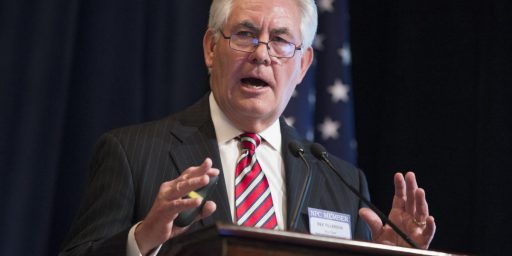

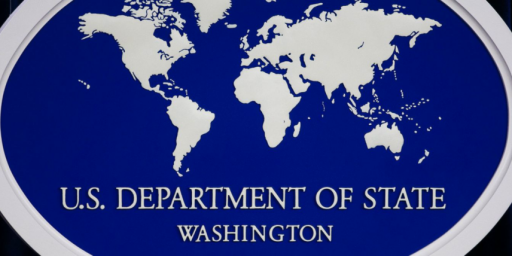
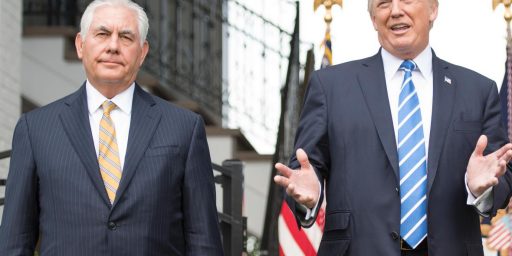
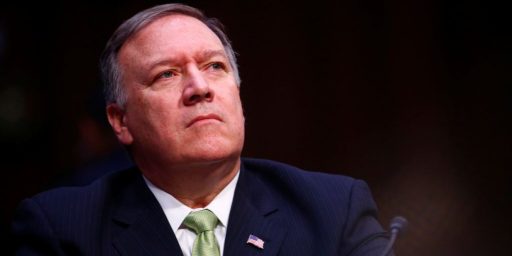
It’s a shame actual diplomats with a committment to peaceful relations are never appointed to run the organization ostensibly tasked to pursue the nation’s interests in a non-violent fashion. Has there been a Secretary of State in our lifetime who considered war a failure rather than a preferred tool of statecraft?
@Ben Wolf: I don’t mind that our cabinet secretaries aren’t career professionals. Their job is the help implement the President’s vision. Ideally, they’d have some related expertise from time in government, academia, or business—and Pompeo has that. He’s been CIA Director, sat on the House Intelligence committee, and trained at West Point and Harvard Law. I’m skeptical of his personality and ideology but not because he’s not a career diplomat.
@James Joyner:
For most Cabinet positions I tend to agree. The Cabinet Secretary is, generally speaking, supposed to be an administrator rather than an expert in a specific policy area. It does seem like there ought to be some exceptions to that rule.
A Treasury Secretary who had no experience in finance would be a concern, for example, and as I’ve said elsewhere a position such as Secretary of Veterans Affairs would ideally be filled with someone with experience at the top of large organizations, preferably in the medical field.
One could arguably make a similar argument about Secretary of State, who is supposed to be the nation’s representative on the world stage and the chief diplomatic spokesperson for the President. That doesn’t mean they need to be a career diplomat, of course, but it does point out that the biggest problem with Tillerson is that he didn’t really have any experience on the diplomatic front notwithstanding his years as CEO of ExxonMobil. I guess Pompeo’s resume is better but we’ll have to wait and see whether the experience he does have translates into better results than we saw during Trump’s first year in office.
@James Joyner: Isn’t there something to recommend a person who has devoted their life in a pursuit over what more resembles a diletante? And shouldn’t the people who do the real work on the ground have a real shot at rising to the top to help make policy?
I’m not aiming this personally at Pompeo, because I have no reason to believe he’s any worse or better than Clinton or Rice or Kerry. The problem is the complete lack of continuity in foreign policy from one presidency to the next, as we’re now seeing in regard to Iran, and the welding of Secretaries of State to the military since Dean Rusk. In the last two decades, nominees have increasingly been characterized by their bellicosity.
@Doug Mataconis: I agree and we should take it further. The military is the single most powerful institution in Washington. Where is the counterbalance to that? So far as can be determined there isn’t one. Obama made some grievous mistakes in foreign policy because his Secretary of Defense, his general staff and his Secretary of State were all telling him the same thing. This also happened during the Bush Administration.
Given the enormous temptation to use a military that is overwhelmingly dominant, why aren’t Secretaries of State expected, or even required as an oath of office, to act as a check?
@Ben Wolf: By law, the Secretary of Defense can not only not be a sitting general or admiral, they can’t have been a general or admiral in the last 7 years. Jim Mattis had to get a personal exception passed through Congress to bypass this. And DoD is much larger than State.
In an ideal world, a Secretary would fill key some senior posts with career officials. Indeed, this almost always happens at both State and DoD (I simply don’t pay enough attention to other agencies to comment). We tend to fill most ambassadorships with career officials. But the whole point of having POTUS appoint, with Senate confirmation, key posts is to allow the Chief Executive to have people he trusts to carry out his policy running the government.
Conversely, in an ideal world, career bureaucrats—even those in the Senior Executive Service—would be fonts of expertise who adroitly execute the policy directives of the President and the Secretary, not people with an agenda of their own. And Presidents and Secretaries would trust their advise precisely because they’re experienced voices simply trying to help the elected leadership execute policy wisely.
@James Joyner: I don’t think it really matters that a general officer can’t be Secretary of Defense without special permission. We know since Kissinger’s “anything that flies on anything that moves” order, that the line between State and Defense has been blurred, to say the least. Bush II’s Administration made State effectively subordinate to Defense. Where is the institutional counter to American Presidents’ demonstrated propensity toward violent activism? How are the nation’s interests served by appointing another belligerent to State when you’ve already got an intelligence bureacracy and military bureacracy full of them?
@Ben Wolf:
You may have heard of John Kerry…
One argument for not appointing a career diplomat as SOS is that their raison d’etre is to promote White House policies regardless of their own opinions. The SOS needs to have opinions and the will to act on them.
@Ben Wolf:
It’s Congress, so we’re basically screwed.
@SKI: Kerry advocated for an attack against the Syrian regime even after the President had publicly ruled it out. He was no peacemaker.
While Tillerson set up really low expectations for his successor, he was a proverbial tough act to follow compared to what awaits Trump’s successor.
@MarkedMan:
And who’s to say that a career diplomat doesn’t have opinions of their own or the ability to provide alternative views to the President? In fact, I’d argue that someone who has served in the diplomatic field would arguably have the best perspective in this regard. For example, I argued at the time that Jon Huntsman, who has served as Ambassador to Singapore and to China, as well as having experience inside the White House and as Governor of Utah, would have been a good choice for Secretary of State. Certainly better than Tillerson. He’s now, of course, Ambassador to Russia.
I am willing to bet that a tweet critical of Mr. Pompeo will be issued within the next nine months. I am proposing a bottle of an Islay single malt as stakes. Any takers?
@Slugger:
Too long a time frame. Ninety days is a better estimate, with nine days not totally unrealistic.
@James Joyner:
Yes. Seeing Pompeo as an improvement seems another triumph of style over substance. It was disappointing, and quite surprising, to see how bad a manager Tillerson was. Having spent his entire working life in Exxon apparently left him unable to adapt to a different culture. But unlike Pompeo, he wasn’t a screaming RWNJ.
@James Joyner:
Which is a good argument for not electing a rank amateur who has no acquaintance at all with government professionals or academics in any field, much less long trusted associates.
@gVOR08:
Absolutely. My constant refrain in response to various reform proposals is: Would we want this reform if we had a normal president? If not, don’t do it. The answer is to elect better presidents. On the other hand, the sheer panic over Trump having this much power is a cautionary tale against giving presidents this much power.